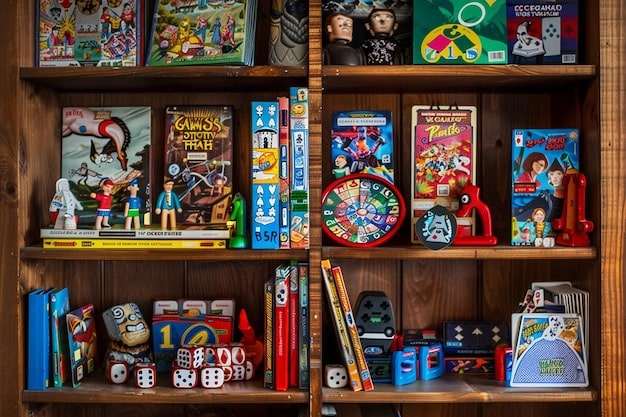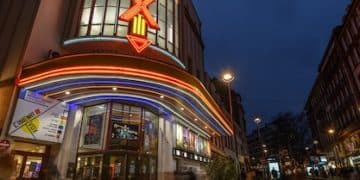Board Game Cafes: The Unexpected Cultural Phenomenon in the US

Board game cafes have emerged as a significant cultural phenomenon in the US, offering social hubs where people connect over tabletop games, fostering community and entertainment beyond digital platforms.
Have you noticed the sudden appearance of board game cafes popping up across the United States? The unexpected rise of board game cafes across the US: a cultural phenomenon? It is reshaping how Americans socialize and enjoy entertainment.
The Genesis of Board Game Cafes
The concept of board game cafes isn’t entirely new; its roots can be traced back to Asia and Europe. However, its adaptation and booming popularity in the United States represent a unique cultural shift. What factors contributed to this stateside surge?
Early Influences and Inspirations
The earliest board game cafes often drew inspiration from Japanese and Korean gaming culture, where communal gaming spaces are more common. These influences helped shape the initial models, emphasizing the social aspect of tabletop games.
Adapting the Model for the US Market
US entrepreneurs tweaked the original cafe model to cater to American tastes. This involved creating a more diverse menu, offering a wider selection of games, and fostering a welcoming environment for both seasoned gamers and newcomers.
- Community Focus: Creating spaces where people can connect face-to-face.
- Game Libraries: Offering extensive collections of games for patrons to explore.
- Event Hosting: Organizing tournaments, game nights, and workshops to attract diverse crowds.
In summary, the rise of board game cafes is not merely a replication of existing models but a reinvention tailored to the American social and entertainment landscape. These establishments have successfully blended gaming culture with the cafe experience, creating a novel and attractive social venue that’s increasingly popular across the country.
Why the Sudden Surge in Popularity?
Several factors have converged to fuel the popularity of board game cafes. From technological fatigue to a craving for real-world social interactions, these cafes offer a unique antidote to the digital age.

The Digital Detox
In an era dominated by screens, many people are actively seeking ways to disconnect and engage in more tangible, face-to-face activities. Board game cafes provide an ideal setting for this “digital detox.”
Craving Social Interaction
The rise of remote work and online communication has left many feeling isolated. Board game cafes offer a much-needed space for real-world social interaction and community building.
The Nostalgia Factor
For many adults, board games evoke fond memories of childhood. Playing these games in a cafe setting can be a nostalgic and comforting experience, adding to their appeal.
- Reduced Screen Time: Promoting alternatives to digital entertainment.
- Enhanced Social Skills: Encouraging face-to-face communication and teamwork.
- Memory Stimulation: Engaging different areas of the brain through strategic gameplay.
In conclusion, the surge in popularity of board game cafes taps into a deeper societal need for connection, nostalgia, and tangible experiences. By offering a break from the digital world and fostering community, these cafes have carved out a unique and appealing niche in the entertainment market.
The Allure of Tabletop Games
Tabletop games have evolved far beyond the classic Monopoly and Scrabble. The modern board game industry is thriving, offering complex, cooperative, and immersive experiences that draw in diverse audiences. What makes these games so appealing?
The Evolution of Board Games
Modern board games are characterized by intricate rules, stunning artwork, and engaging narratives. They offer a level of depth and complexity that surpasses traditional games, attracting serious gamers and casual players alike.
Cooperative vs. Competitive Gameplay
Many modern board games emphasize cooperative gameplay, where players work together towards a common goal. This fosters teamwork and camaraderie, enhancing the social experience of gaming.
The Immersive Experience
With elaborate components, thematic elements, and strategic depth, modern board games offer an immersive experience that can transport players to fantastical worlds or challenging scenarios.

Board game cafes have created a new culture around tabletop games, transforming them from simple pastimes into sought-after social events.
- Strategic Thinking: Enhancing problem-solving and decision-making skills.
- Social Bonding: Strengthening relationships through shared experiences.
- Creative Expression: Encouraging imagination and storytelling.
In essence, the allure of tabletop games at board game cafes extends beyond mere entertainment. These games provide opportunities for strategic thinking, social bonding, and creative expression, making them a compelling and valuable activity in today’s fast-paced world.
Building Community and Social Connections
A core element of the board game cafe phenomenon is their role in fostering community and social connections. These cafes offer a welcoming space for people to meet, interact, and form bonds over shared interests. How do they achieve this?
Creating a Welcoming Atmosphere
Board game cafes often prioritize creating a warm and inclusive environment. This involves comfortable seating, inviting décor, and friendly staff who are passionate about games and eager to help patrons find the perfect match.
Hosting Events and Tournaments
Many cafes organize regular events, such as open game nights, thematic tournaments, and learn-to-play sessions. These events provide opportunities for people to meet new friends and connect with fellow gamers.
Facilitating Social Interaction
By encouraging face-to-face interaction and teamwork, board game cafes help combat social isolation and promote a sense of belonging. The shared experience of playing a game can break down barriers and create lasting connections.
The sense of community fostered in board game cafes makes people gather to pursue a common hobby, and build social skills alongside it.
- Combating Loneliness: Providing spaces for meaningful social interaction.
- Building Relationships: Fostering connections through shared experiences.
- Enhancing Social Skills: Encouraging communication and teamwork.
The rise of these cafes is fueled by the sense of togetherness people feel by participating in social activities.
In summary, board game cafes have become vital community hubs where people can connect, share experiences, and build lasting relationships. By prioritizing inclusivity, hosting engaging events, and facilitating social interaction, these cafes have created a unique and valuable social space in the modern world.
The Business Model of Board Game Cafes
The success of board game cafes relies on a sustainable business model that balances revenue generation with customer satisfaction. How do these establishments stay afloat while providing an enjoyable experience?
Charging a Play Fee
Many board game cafes charge an hourly or daily play fee, which grants patrons access to the cafe’s extensive game library. This fee helps cover the cost of maintaining the collection and providing a gaming space.
Selling Food and Beverages
Like traditional cafes, board game cafes generate revenue through the sale of food and beverages. Many offer a diverse menu of snacks, meals, and specialty drinks to cater to different tastes.
Retail Sales of Games and Accessories
Some board game cafes also sell games and accessories, allowing patrons to purchase their favorite titles and expand their own collections. This can be a significant source of revenue for the business.
The multiple revenue streams can sustain the business, and also provide a satisfying customer experience.
- Diversified Income: Balancing play fees, food sales, and retail revenue.
- Customer Loyalty: Encouraging repeat visits through membership programs and events.
- Inventory Management: Keeping the game library fresh and appealing.
These commercial establishments provide entertainment with a twist, where groups of friends and family enjoy a break from the digital space.
In conclusion, the business model of board game cafes is a multifaceted approach that combines various sources of revenue with a focus on customer satisfaction. By charging play fees, selling food and beverages, and offering retail sales, these cafes can maintain a sustainable business while providing a unique and enjoyable gaming experience.
Challenges and the Future of Board Game Cafes
Despite their rising popularity, board game cafes face several challenges that could impact their long-term sustainability. What are these hurdles, and how can they be overcome?
Competition from Other Entertainment Venues
Board game cafes compete with a wide range of entertainment options, including movie theaters, restaurants, and online gaming platforms. Standing out in a crowded market requires constant innovation and differentiation.
Maintaining a Relevant Game Library
Keeping the game library fresh and appealing is essential for attracting repeat customers. This requires ongoing investment in new games and careful management of the existing collection.
Adapting to Changing Trends
The entertainment landscape is constantly evolving, and board game cafes must adapt to changing trends to remain relevant. This might involve incorporating new technologies, expanding their offerings, or catering to niche audiences.
To solidify their presence in the local communities, board game cafes must adapt to their surroundings and the needs of their customers.
They must also establish themselves as a stable presence to the market.
- Innovation: Staying ahead of the competition with unique offerings.
- Community Engagement: Building strong relationships with local gamers.
- Adaptability: Responding to changing consumer preferences.
The evolution of such establishments is fueled by their ability to adapt and be receptive to improvements.
In summary, the future of board game cafes depends on their ability to overcome challenges such as competition, inventory management, and changing trends. By focusing on innovation, community engagement, and adaptability, these cafes can solidify their position as a unique and valuable part of the entertainment landscape.
| Key Point | Brief Description |
|---|---|
| 🎉 Social Interaction | Offers a space for face-to-face connections and community building. |
| 🎲 Variety of Games | Provides access to an extensive library of modern and classic board games. |
| ☕ Cafe Experience | Combines gaming with food and beverages for a relaxed atmosphere. |
| 📅 Events & Tournaments | Hosts regular events, tournaments, and learn-to-play sessions. |
Frequently Asked Questions
▼
A board game cafe is a venue that combines the atmosphere of a coffee shop with the entertainment of a game library. Patrons can play a variety of board games while enjoying food and beverages.
▼
Board game cafes generate revenue through a combination of play fees, food and beverage sales, and retail sales of board games and accessories. Some cafes also offer membership programs.
▼
Board game cafes offer a unique social experience that combines entertainment with face-to-face interaction. They provide an alternative to digital entertainment by encouraging people to connect in person.
▼
Board game cafes typically offer a wide variety of games, including classic board games like Monopoly and Scrabble, as well as modern titles that focus on strategy, cooperation, and storytelling.
▼
Yes, most board game cafes cater to a wide range of ages, from children to adults. They often have games suitable for different age groups and skill levels. Many are family-friendly venues.
Conclusion
The rise of board game cafes in the US is a testament to the enduring appeal of face-to-face social interaction and the growing popularity of modern tabletop games. These cafes offer a unique blend of entertainment, community, and nostalgia that resonates with a diverse audience, carving out a special niche in the cultural landscape.





